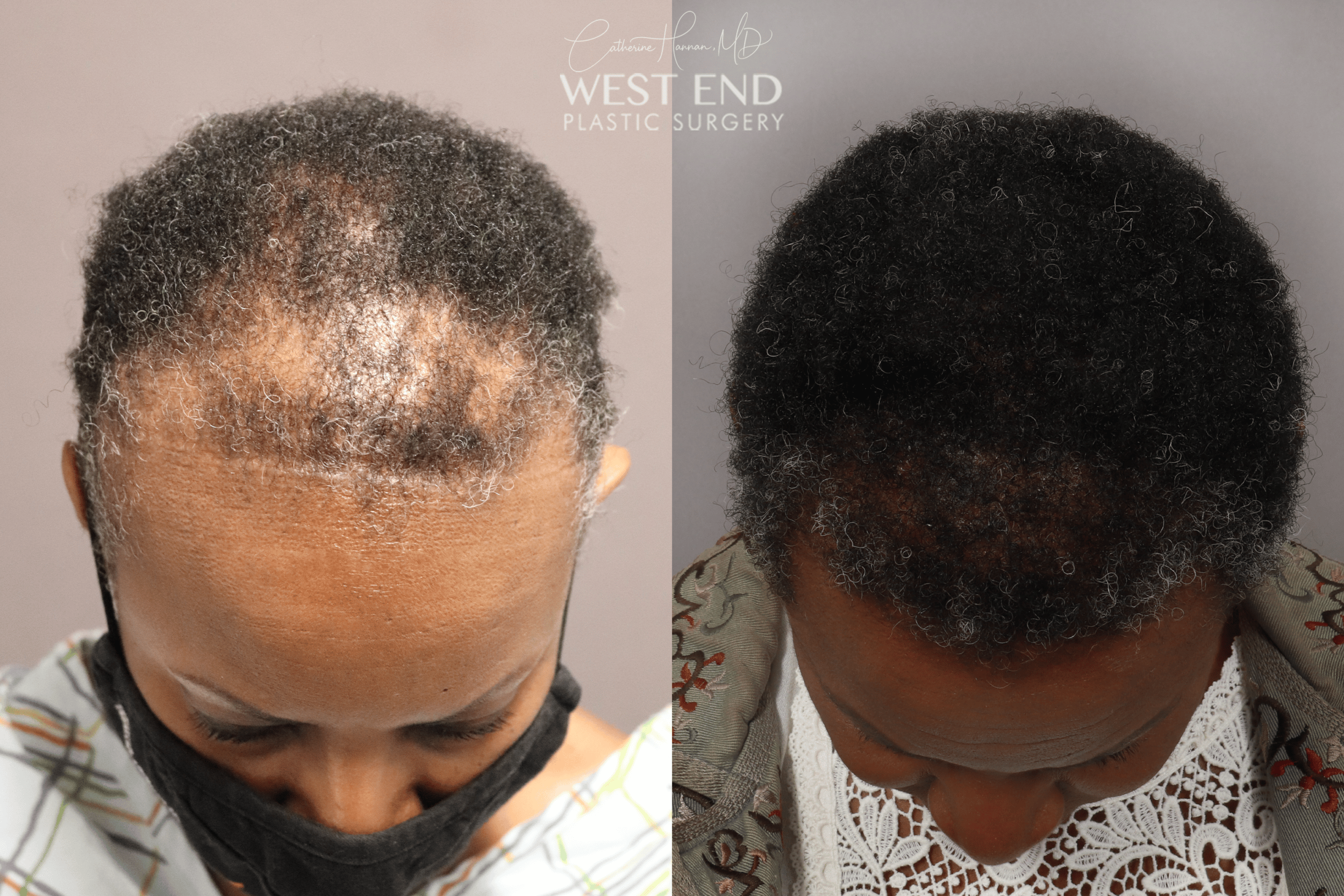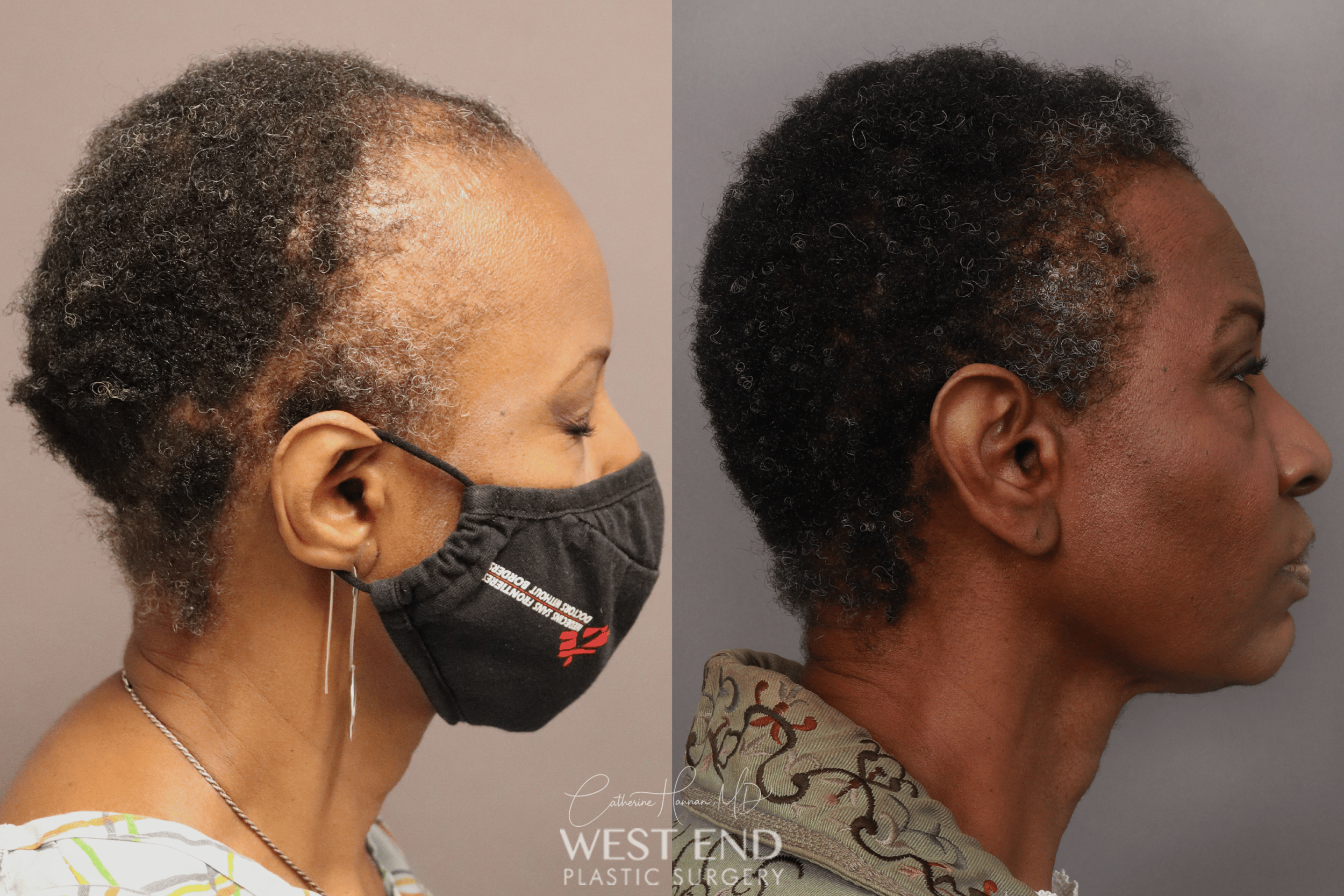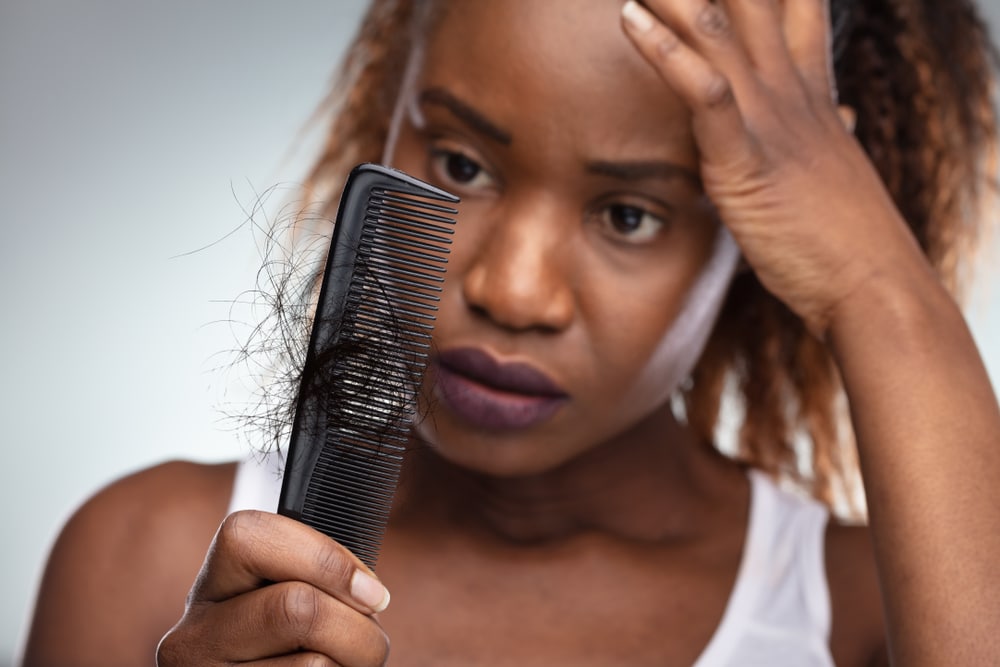Hair loss in women is not discussed nearly as frequently as hair loss in men, yet it is a very common occurrence, affecting as many as 30 million women in the United States. Hair loss can occur as a result of aging, heredity, medications or an underlying medical condition, and can affect women of all ages. It may result in a higher than normal hairline, pattern baldness, patchy spots or thinned hair toward the back of the head. Most women are troubled by this undesired change in appearance and may experience frustration, embarrassment or more severe psychological distress due to this condition.
The patterns of hair loss are typically different in women than men. Men often experience a receding hairline at the front of the scalp or loss of hair at the crown. In women, the hair loss or thinning tends to take place toward the top of the scalp, across a fairly large portion of the head. Their parts grow wider and the scalp becomes more visible if the hair is not arranged precisely. Hair loss typically begins to be evident in women in their 50s or 60s, but may be experienced earlier.


Causes of Hair Loss in Women
In order to properly diagnose the cause of female hair loss, the physician must take a personal history and perform a full medical examination. In addition, blood tests may be administered to determine whether the hair loss is caused by another underlying medical condition. Once the reason for the hair loss is determined, an effective treatment plan can be developed, tailored to the patient‘s particular circumstances. Depending on the cause, extent, and location of the hair loss, treatment options may include medication, laser or ultraviolet light therapy, or a surgical hair transplant.
Hormone Changes
Common times for hair loss in women are when there are significant changes in hormone levels, as in the months after giving birth and during menopause. The hair loss which may follow childbirth is almost always temporary.
Traction Alopecia
Improper hair care is a frequent cause of hair loss in girls and women. When the hair is pulled tightly onto hair rollers or into certain hair styles, or when harsh chemical dyes or treatments are used, the scalp can be damaged and even permanently scarred, causing hair loss.
Alopecia Areata
Alopecia areata is a condition in which individuals experience round patches of hair loss. Its exact cause is unknown, although research suggests it is an autoimmune disorder with a genetic component.
Androgenetic Alopecia
Androgenetic alopecia is the medical term for so-called male-pattern baldness, which can occur in women as well as men. While it is often an inherited condition, other factors may influence androgenetic alopecia such as hormones and aging.
Telogen Effluvium
During the third stage of hair growth, known as telogen, hairs are shed in preparation for new growth. For unknown reasons, growing hairs may be shocked into a dormant state, typically as a result of a psychic trauma, resulting in excessive hair loss.
Other Causes of Hair Loss in Women
Like men, women may also suffer hair loss due to a number of other causes. At times, such causes may result in only temporary hair loss or may be curable when the underlying disorder is addressed. Such causes may include:
- Fungal infections of the scalp
- Severe infections or high fevers
- Poor nutrition, fad dieting or eating disorders
- Certain medications
- Trichotillomania, compulsive pulling of one‘s own hair
- Thyroid or pituitary disorders
- Certain skin disorders, such as eczema or psoriasis
- Autoimmune diseases, such as lupus
- Chemotherapy or radiation therapy

Treatment of Hair Loss in Women
Depending on the cause, extent, and location of the hair loss in women, there are several treatment options available. These include medications, such as Minoxidil, medicated shampoos and conditioners, laser or ultraviolet light therapy, and surgical hair transplants. A great many women are content to live with minor hair loss, or to wear wigs or decorative head coverings.

Is Hair Loss Treatment Permanent?
At West End Hair Restoration, we offer a range of treatments for female hair loss. Some, such as Minoxidil, work very well when actively used, but their effects wane after treatment is ceased. Others, such as surgical hair transplants, will continue producing results for several years.
We offer NeoGraft for surgical hair transplantation. Less invasive than other methods, NeoGraft for Women requires no sutures and does not create a linear scar. This hair transplant option is also more comfortable than other surgical treatments.
During your initial consultation, we will carefully evaluate your hair loss, listen to your concerns, review your goals, and help you choose the best solution for your specific needs.
How Many Treatments Will I Need?
The number of sessions needed for optimal results depends on the treatment used. For example, it may take two or more surgical treatments to achieve optimal results, while UV light therapy might require five to six treatments before results are noticeable.
Oral medications typically start to produce results within one month, but it may take up to six months of continuous usage for significant hair regrowth. Likewise, Shampoos and conditioners may take one to two months to show results.

As with all aspects of hair loss treatment, how many sessions you will require and how long you will need to wait for results depends on factors unique to your anatomy, the root cause of hair loss, and more. During your initial consultation, we will discuss your treatment options to help you select the best one for your needs.
What is Hair Loss Treatment Recovery Like?
There is no recovery from oral hair loss medications or hair loss shampoos and conditioners. Similarly, there is no recovery following UV light therapy for hair loss. There is, however, a short recovery period for surgical hair transplants.
Recovery from a surgical hair transplant can take up to two weeks. Redness, scabbing, swelling, and mild discomfort are all possible during this time. Recovery from surgical hair transplant with NeoGraft is shorter, though. Most people can resume normal activities within one to five days.
Complications are extremely rare with hair transplant surgery. However, we will provide you with after-care instructions to help reduce the risk of discomfort and ensure the most rewarding experience possible.
Are There Any Risks to Hair Loss Treatment for Women?
Risks posed by Minoxidil include dizziness, irregular heartbeat, weight gain, swelling of hands and feet, chest pain, and difficulty breathing. These are rare, but should they occur, ceasing the medication will be necessary.
NeoGraft hair transplant risks include unnatural hair lines, visible scars, and patchy hair loss. These complications are reduced when you work with an experienced provider, like the board-certified plastic surgeons at West End Hair Restoration.
Some sulfates, found in shampoos and conditioners, can damage the scalp. Topical hair loss products must contain safe and efficacious ingredients to help prevent issues. We can help you select the best products for your specific needs.
There are no risks associated with UV hair restoration.
Natural Remedies for Treating Hair Loss in Women
For women experiencing hair loss, natural remedies may help improve hair health and promote regrowth. While these remedies are not guaranteed, they can complement other treatments:
- Scalp Massage: Increases blood flow to hair follicles to encourage hair growth.
- Essential Oils: Rosemary, peppermint, and lavender may stimulate hair growth when massaged into the scalp.
- Balanced Diet: Eating foods rich in iron, protein, zinc, and vitamins (especially B vitamins) supports healthy hair.
- Biotin Supplements: Biotin (Vitamin B7) is believed to promote hair strength and growth, though consult a doctor before use.
- Aloe Vera: Helps reduce scalp inflammation and promotes healthy hair growth.
- Avoid Tight Hairstyles: Reducing strain on hair from tight ponytails or braids can prevent further loss.
These remedies may help maintain hair health, but it’s best to consult a doctor if hair loss persists.
When You Should See a Doctor About Female Hair Loss

Hair loss in women can cause distress, but not all cases require immediate medical attention. However, certain signs and symptoms indicate it’s time to consult a healthcare professional. You should see a doctor if you have:
- Sudden or patchy hair loss without a clear cause
- Excessive shedding that lasts longer than usual
- Accompanying symptoms like fatigue or weight changes
- Scalp irritation or inflammation with hair loss
- Family history of female pattern baldness or other conditions
- Postpartum hair loss that doesn’t improve after several months
If you experience these signs, consult a healthcare professional for evaluation and treatment.
Why Choose West End Hair Restoration
At West End Hair Restoration in Washington, DC, patients receive personalized treatment with cutting-edge technology. The center specializes in NeoGraft Automated Hair Transplantation, a minimally invasive treatment with no linear scarring and a shorter recovery time. The facility is AAAASF accredited, ensuring patient safety and comfort, with a private surgical suite for a tailored experience. Whether addressing hair loss in men or women, our individualized approach is designed to achieve natural-looking results for every patient.
Dr. Lexie Wang is a Facial Plastic and Reconstructive Surgeon at West End Hair Restoration. She specializes in cosmetic and reconstructive procedures for the face and neck. Dr. Wang completed her prestigious fellowship with Dr. Paul Nassif, a renowned surgeon and star of Botched. With extensive training from top surgeons worldwide, Dr. Wang is skilled in complex facial surgeries and offers expert care in hair restoration.
Frequently Asked Questions (FAQs)
Is female hair loss permanent?
Not always. Female hair loss can be either temporary or permanent, depending on the cause. Temporary hair loss is often due to factors like stress, hormonal changes, or certain medical conditions, while permanent hair loss can result from female pattern baldness or scarring conditions.
How can I tell if I’m experiencing hair loss or normal shedding?
Normal shedding involves losing around 50-100 hairs per day. If you notice significantly more hair falling out when brushing, washing, or on your pillow, or if your hair is thinning visibly, you might be experiencing abnormal hair loss.
Does hair loss affect women of all ages?
Yes, hair loss can affect women of all ages. While it’s more common after menopause, women can experience hair loss in their teens, 20s, or 30s due to genetics, stress, or other health issues.
How does diet affect hair loss in women?
Diet plays a crucial role in hair health. Deficiencies in nutrients like iron, protein, zinc, and vitamins (especially B vitamins) can lead to hair thinning or shedding. A well-balanced diet supports healthy hair growth.
Seek Treatment for Female Hair Loss in Washington, DC
If you’re experiencing female hair loss and are ready to take control, contact us today at 202-785-4187 to schedule a consultation with the renowned Dr. Wang. She will assess your condition and help you explore your options for regrowing your hair and boosting your self confidence.
